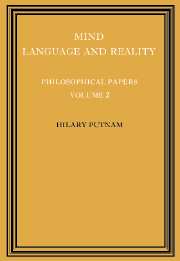Book contents
- Frontmatter
- Contents
- Dedication
- Introduction
- 1 Language and philosophy
- 2 The analytic and the synthetic
- 3 Do true assertions correspond to reality?
- 4 Some issues in the theory of grammar
- 5 The ‘innateness hypothesis’ and explanatory models in linguistics
- 6 How not to talk about meaning
- 7 Review ofThe concept of a person
- 8 Is semantics possible?
- 9 The refutation of conventionalism
- 10 Reply to Gerald Massey
- 11 Explanation and reference
- 12 The meaning of ‘meaning’
- 13 Language and reality
- 14 Philosophy and our mental life
- 15 Dreaming and ‘depth grammar’
- 16 Brains and behavior
- 17 Other minds
- 18 Minds and machines
- 19 Robots: machines or artificially created life?
- 20 The mental life of some machines
- 21 The nature of mental states
- 22 Logical positivism and the philosophy of mind
- Bibliography
- Index
14 - Philosophy and our mental life
Published online by Cambridge University Press: 12 January 2010
- Frontmatter
- Contents
- Dedication
- Introduction
- 1 Language and philosophy
- 2 The analytic and the synthetic
- 3 Do true assertions correspond to reality?
- 4 Some issues in the theory of grammar
- 5 The ‘innateness hypothesis’ and explanatory models in linguistics
- 6 How not to talk about meaning
- 7 Review ofThe concept of a person
- 8 Is semantics possible?
- 9 The refutation of conventionalism
- 10 Reply to Gerald Massey
- 11 Explanation and reference
- 12 The meaning of ‘meaning’
- 13 Language and reality
- 14 Philosophy and our mental life
- 15 Dreaming and ‘depth grammar’
- 16 Brains and behavior
- 17 Other minds
- 18 Minds and machines
- 19 Robots: machines or artificially created life?
- 20 The mental life of some machines
- 21 The nature of mental states
- 22 Logical positivism and the philosophy of mind
- Bibliography
- Index
Summary
The question which troubles laymen, and which has long troubled philosophers, even if it is somewhat disguised by today's analytic style of writing philosophy, is this: are we made of matter or soul-stuff? To put it as bluntly as possible, are we just material beings, or are we ‘something more’? In this paper, I will argue as strongly as possible that this whole question rests on false assumptions. My purpose is not to dismiss the question, however, so much as to speak to the real concern which is behind the question. The real concern is, I believe, with the autonomy of our mental life.
People are worried that we may be debunked, that our behavior may be exposed as really explained by something mechanical. Not, to be sure, mechanical in the old sense of cogs and pulleys, but in the newer sense of electricity and magnetism and quantum chemistry and so forth. In this paper, part of what I want to do is to argue that this can't happen. Mentality is a real and autonomous feature of our world.
But even more important, at least in my feeling, is the fact that this whole question has nothing to do with our substance. Strange as it may seem to common sense and to sophisticated intuition alike, the question of the autonomy of our mental life does not hinge on and has nothing to do with that all too popular, all too old question about matter or soul-stuff.
- Type
- Chapter
- Information
- Philosophical Papers , pp. 291 - 303Publisher: Cambridge University PressPrint publication year: 1975
- 125
- Cited by



